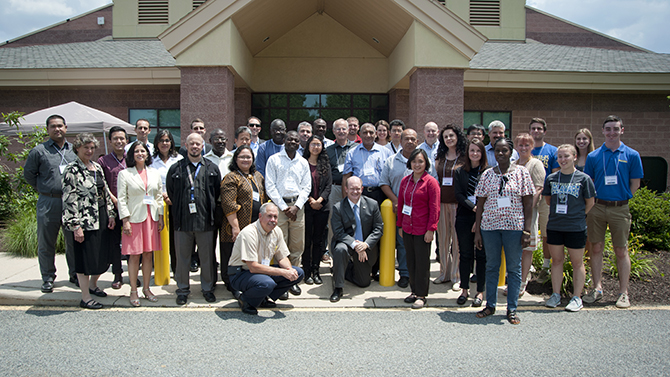


Managing poultry diseases
Photo by Wenbo Fan June 28, 2016
Emergency poultry disease response workshop considers biosecurity, rapid reaction
According to Vimbai Michael Magaisa, the most vulnerable birds when it comes to avian influenza (AI) in his hometown of Montclair, South Africa, are ostriches. And while there aren’t as many ostriches in Delaware as there are in his home country, Magaisa still learned helpful tools and important lessons about how to manage the disease and other poultry afflictions at the 2016 Emergency Poultry Disease Response Certificate Program workshop held at the University of Delaware’s College of Agriculture and Natural Resources (CANR) from June 20-24.
Magaisa, who works as a veterinarian responsible for a municipality and heard about the CANR program through an email from a friend, was one of 20 international participants who attended the certificate program, now in its eighth year.
Magaisa said that having participants from many different countries was beneficial as it allowed them to get a wide range of perspectives on the poultry industry.
“With the interactions, you get to understand other perspectives that you might not see in your own situation but that might help you in applying some of the concepts that we are learning. We’ve got quite a diverse group and we are learning from each other,” said Magaisa, who added that he plans to keep in touch with the other participants through email and the program’s Facebook group.
Magaisa said the program was very beneficial and also a memorable experience.
“We got to visit a broiler farm, which was an eye opener. The establishment is quite big and some of the procedures were quite new to me. Then we went through to a processing plant that was also awesome. It was just out of this world,” Magaisa said.
Having to deal with several layer farms and a great number of broiler farms, as well as backyard chickens, Magaisa said that everything in the course was useful but perhaps the most beneficial aspect was the importance of surveillance of a disease — such as Newcastle disease or AI — and how to control the disease once it has emerged.
With regard to the state of Delaware and the UD, Magaisa said there were a lot of friendly people and that “the weather is also very friendly, considering where I’m coming from.”
On the first day of the program, participants got to hear from and ask questions of U.S. Sen. Chris Coons (D-Del.) who spoke about the importance of the poultry industry in the United States and specifically in Delaware, where in Sussex County more broiler chickens are grown than in any other county in America.
Coons also spoke about his experience working with U.S. Sen. Johnny Isakson, a Republican from Georgia, to help bring the first American poultry in more than 15 years to South Africa.
“The University of Georgia from his home state does a great deal of education and outreach but no one does a better job than the University of Delaware,” Coons said. “I think it’s a wonderful thing that you’re able to spend a week with us and get concrete, relevant, hands-on training from the people who have responded to the avian influenza outbreak in the Midwest and the Pacific Northwest, and you can hear from us how we coordinate between industry, government and non-profits at a grassroots level and at a statewide level to make sure that we are monitoring, that we are responding, that we are training. I hope you will also bring your knowledge to us and if there’s contributions you care to make, criticisms or questions about how we do it, we welcome that as well.”
Coons said he believes poultry can play a major role in providing protein for a hungry and fast-growing world population.
“Chicken is much more environmentally sound, easier to scale and a more accessible protein for a hungry world and particularly, a rapidly growing Africa. I think poultry has enormous potential but if all we do is grow more poultry in the United States and export it to the rest of the world, I think we will have failed because there are billions more hungry people than are currently being fed,” Coons said, adding, “We should grow the poultry industry in Senegal, in South Africa, in Kenya, in Nigeria, in partnership and learn that way from each other because AI will affect the whole world if we do not manage it, maintain it, control it and poultry can benefit the whole world if we coordinate.”
The program was sponsored by the U.S. Department of Agriculture Animal and Plant Health Inspection Service (USDA-APHIS) in conjunction with UD’s Division of Professional and Continuing Studies and is part of a combination of science-based training programs provided by CANR and the Avian Biosciences Center (ABC) to help Delaware’s national and international emergency disease response capability.
The program was led by Eric Benson, professor in the Department of Animal and Food Sciences (ANFS); Jack Gelb, professor and director of the ABC; Robert Alphin, instructor in ANFS and manager of the University’s Allen Laboratory; Soma Chakrabarti, director of Professional and Continuing Studies (PCS); Patricia Allen, project manager in PCS; and Dan Hougentogler, senior research associate in ANFS.
The participants spent five days learning about the avian influenza virus, disease surveillance and outbreak response and control, among other topics.
The training program also presented and utilized the “Delaware model,” which emphasizes close cooperation between government, industry and educational institutions to manage avian influenza outbreaks with best management practices and technologies related to controlling outbreaks of avian influenza and other diseases.
The participants were able to listen to experts from across the country and Canada with lectures on specific topics — such as the current status of avian influenza in wild birds and how to effectively manage live bird markets.
Contact Us
Have a UDaily story idea?
Contact us at ocm@udel.edu
Members of the press
Contact us at 302-831-NEWS or visit the Media Relations website

